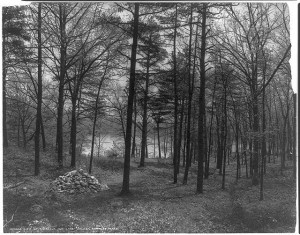“The only person you are destined to become is the person you decide to be.” – Ralph Waldo Emerson
Thoreau’s quote near his cabin site, Walden Pond
by Alex Eflon, used under 
Transcendental Background
Transcendentalists focus on the idea of individualism and creativity. All knowledge begins with self-knowledge. Society should want to achieve a higher self, while standing up and questioning any institution or individual that claims to be a higher authority (Reuben, 2011). It is the duty of society to revolt and not settle with compromise. Individuals should rise about the materialistic and consumerist society through acts of compassion, selflessness, and care for nature and all living beings. In Transcendental views, nature is highly symbolic and a living mystery. The roots of this philosophy were traced back to Germany, specifically in the works of Kant. (Rahn, 2008)
In regards to literature, the Transcendental literary stage was brief, but continued to be a long-lasting influence on American literature. These works led to a new way of understanding truth and knowledge, specifically through reasoning. This movement flourished between the early to middle years of the nineteenth century. (Rahn, 2008)
Nature: A Transcendentalist’s Love
by DetroitPublishingCo, used under ![]()
Why Transcendental Literature was Revolutionary
The Transcendental movement in literature tends to be more revolutionary rather than evolutionary. There was a clear change when the Transcendental Club first gathered in 1836 in Massachusetts. However, it soon ended when one of its prominent contributors, Margaret Fuller, passed away in 1850. With Fuller’s death, a great silence was found, not only from the work she had done, but also from the father of the movement, Ralph Emerson. Emerson lacked the desire and vitality to continue on to follow her path, specifically lacking the egotism to take lead at movements and to attach his name to progressive political initiatives. Although the movement was short-lived, the influence it left on American literature was long-lasting. (Rahn, 2008)
Transcendentalists raise ethical implications, focusing on the idea of a rising above selfish acts and achieving a higher self. From the beginning, Emerson and Thoreau spoke out against injustices, including slavery and women’s rights. There was a clear distinction between what was right and what was wrong as the materialistic and consumerist society began. (Challman, 2008)
With the writings of these Transcendentalists, imbalances arose. A great excitement was placed on America and the hopes of bringing their literature to this new land. “The Transcendentalists saw an opportunity to make a break with England and forge a new literature for a new continent. That literature would be bold and expressive, and a bit wild, like the land itself.” (Rahn, 2008)
For more information about American Transcendentalism
Overview of Transcendentalism and Controversy within
Book on Influence of Emerson and Thoreau and Transcendentalism
Video on the basic truths of Transcendentalism
References:
Challman, R. (2008).”Transcendentalism: Essential Essays of Emerson & Thoreau.” Transcendentalism. Prestwick House Inc, n.d. 09 Apr. 2014.
Detroit Publishing (1908). The site of Henry David Thoreau’s Cabin. [Digital Image] Retrieved from http://en.wikipedia.org/wiki/File:Site_throeau_cabin_loc.jpg. Available under Library of Congress.
Eflon, A. (2010). Thoreau’s quote near his cabin side, Walden Pond. [Digital Image] Retrieved from http://en.wikipedia.org/wiki/File:Thoreaus_quote_near_his_cabin_site,_Walden_Pond.jpg . Available under Creative Commons.
Rahn, J. (n.d.). Transcendentalism. The Literature Network. Retrieved April 7, 2014
Reuben, P. (2011, October 24). PAL: American Transcendentalism: ABrief Introduction.PAL: American Transcendentalism: ABrief Introduction. Retrieved April 9, 2014


